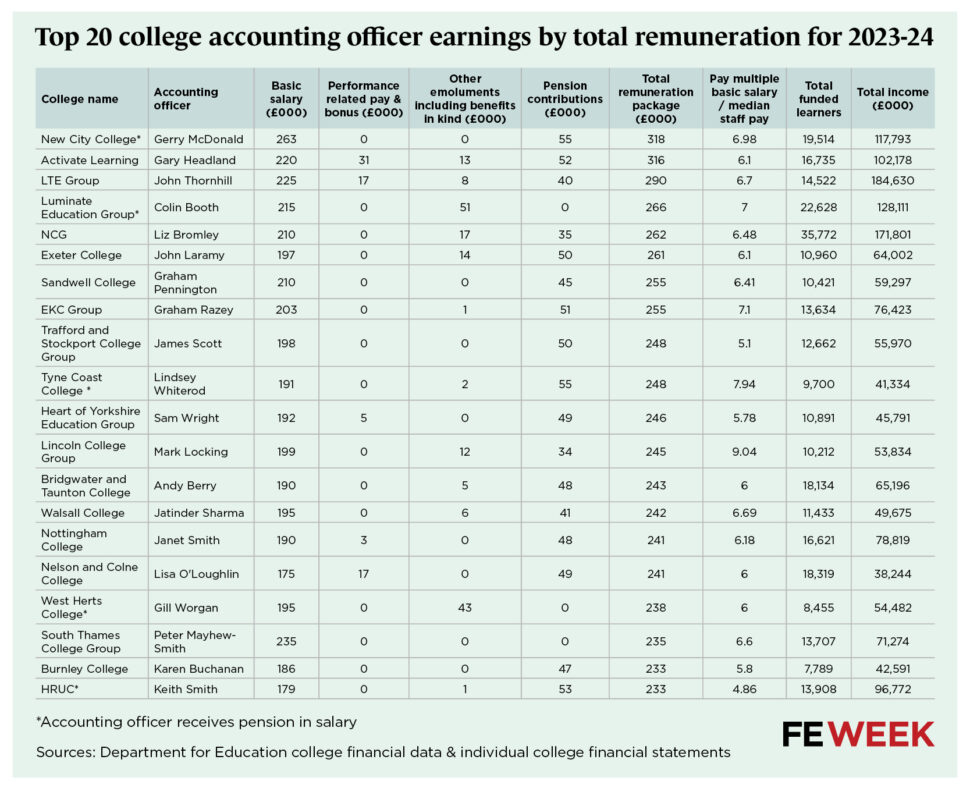The number of college chief executives paid more than £200,000 has more than tripled since the pandemic.
And analysis of new data reveals two colleges fork out over £300,000 for their leader.
FE Week’s investigation shows that average principal earnings, which include basic salary, bonuses, benefits in kind and pensions, have risen 15 per cent from £163,000 in 2019-20 to £188,000 in 2023-24.
Seventy-one principals had total pay packages of £200,000 or more in 2023-24, up from 47 the previous year and 22 in 2019-20.
But while CEO pay has grown, the highest paid college leaders still receive less than their counterparts running universities and large multi-academy trusts.
Julian Gravatt, deputy chief executive at the Association of Colleges, said: “College principals play a pivotal role in steering institutions towards success, managing complex operations, and ensuring the best outcomes for students.
“Their pay reflects the significant responsibilities they bear and the competitive market for experienced educational leaders”.
New City and Activate have highest earners
FE Week’s analysis is based on the Department for Education’s annual college accounts database for 2023-24, published earlier this month, and was cross-referenced with individual published financial statements.
We have focused on total emoluments as growing numbers of principals are receiving payments in lieu of their pension that are, in some cases, being added to their basic salary instead of being reported separately, which leads to distorted figures.
Published data includes financial information on England’s 221 colleges and designated institutions. Data was missing for five. We have excluded colleges that had multiple principals that year, leaving 197 for our analysis.
The highest-paid principal in the country last year was Gerry McDonald, who runs east London’s New City College, receiving a total salary package worth £318,000.
This included basic pay of £263,000 plus a payment in lieu of pension of £55,000. According to the DfE accounts database, New City College had 19,514 DfE-funded learners in 2023-24 and total income of almost £118 million – both figures are in the top four for colleges nationally.
New City College declined to comment.
Oxfordshire-based Activate Learning’s chief executive Gary Headland received a £316,000 salary package, which was made up of £220,000 basic wage, a £31,000 performance bonus, £13,000 in benefits in kind and £52,000 pension contributions. Activate had 16,735 DfE-funded learners and an income of over £102 million.
A spokesperson for Activate said Headland was “responsible for the delivery of further and higher education across eight college campuses in Oxfordshire, Berkshire and Surrey, as well as substantial national online and apprenticeships provision”.
Manchester’s LTE group’s long-standing chief executive John Thornhill ranked third, earning £290,000. This included basic salary of £225,000, a £17,000 bonus, £8,000 in benefits in kind and £40,000 of pension contributions.
LTE had 14,522 DfE-funded students in 2023-24 but recorded the highest total income of over £184 million.
LTE is a national group, which runs The Manchester College as well as seven other education and training organisations across England and Wales which collectively support around 50,000 learners each year.
Its spokesperson said: “The LTE group board insists that part of the CEO’s remuneration package should be based on performance, and a balanced scorecard of targets linked to performance across the organisations which make up the group is agreed at the start of each year.”
Not all college principals’ salaries appeared to be in line with income or student body size.
Chief executive officer of NCG Liz Bromley’s total remuneration, £262,000, was the seventh largest in England.
But her college group – spread across the north, midlands and London – educates 35,722 funded learners and manages the second highest income of £171 million each year.

Up to £37k bonuses
The DfE’s accounts database showed 17 colleges paid a performance-related bonus to their principal in 2023-24.
The highest of these was a £37,000 bonus for Dawn Ward, former principal of Burton and South Derbyshire College (BSDC), and £31,000 for Activate Learning’s Headland.
A BSDC spokesperson said Ward’s package reflected her “significant” 15 years of experience leading the college group and was aligned with key performance indicators such as Ofsted inspection grades and “success in securing lucrative global commercial contracts in countries such as Saudi Arabia”.
Activate Learning’s accounts said the performance-related pay was a “contractual entitlement” but noted the remuneration committee kept Headland’s basic salary “the same” in 2023-24, while the rest of the group’s staff received a consolidated pay rise of 6.5 per cent.
An Activate spokesperson said this was the first year Headland received a “discretionary” £31,000 bonus, which was based upon “clearly defined objectives”.
Payments in lieu
FE Week noticed different approaches to how colleges classified principals’ payments in lieu of pension – which is where employees opt to receive cash instead of their pension contribution.
Some, such as New City College, declared their CEO’s £55,000 payment as ‘payment in lieu of pension’ in their accounts, while others, such as Hammersmith, Richmond and Uxbridge Colleges (HRUC), included the cash payment under ‘salaries’.
A spokesperson for Luminate, which counted its principal’s payment in lieu as a ‘benefit in kind’ said they were confident this was the correct approach.
Biggest increase isn’t what it seems
The principal that appeared to have the largest salary raise between 2022-23 and 2023-24 was HRUC chief executive Keith Smith, whose full-time equivalent salary increased 17 per cent per cent from £198,780 to £232,000, according to the college group’s published accounts.
However, following an approach for comment from FE Week, HRUC said Smith’s basic FTE salary in 2022-23 was £165,000 and had risen to £179,850, a 9 per cent increase. The college explained that the salaries stated in its accounts were total emoluments to the accounting officer and included pension contributions, although this was not reported separately in the accounts.
The DfE’s accounts direction states colleges must separately disclose emoluments, including a breakdown of basic salary and pension contributions.
HRUC now plans to declare payments in lieu of pension separately in its future accounts, FE Week understands.
Top job has grown
Colleges have dramatically increased in size and complexity during the last decade as they merged into large regional groups with incomes of up to £180 million per year, involving large commercial contracts and overseas ventures in some cases.
The DfE’s ‘college accounts direction’ for 2023-24 said institutions must publish the total pay principals receive and explain how it is linked to value and performance delivered, including “benchmarking or other means of comparison to the broader market”.
Most colleges state in their accounts that they have adopted the Association of Colleges’ (AoC) senior post holder remuneration code, which says colleges must regularly review principals’ salaries through an independent process such as a remuneration committee that makes “fair, appropriate and justifiable” decisions on pay.
Colleges now require government approval for salaries above £150,000, following reclassification to the public sector in 2022.
How do salaries compare?
Pay for FE college leaders is lower than those in the crisis-hit university sector who, according to The Times, were paid a median total salary of £340,901 in 2023-24, a 13 per cent rise since 2020-21.
University of Cambridge vice-chancellor Professor Deborah Prentice received the highest total salary of £577,000.
And according to FE Week’s sister publication Schools Week, 64 of England’s multi-academy school trust CEOs were paid more than £200,000 in basic salaries, although their overall salary cost is likely to be higher when counting pension contributions.
The highest-paid, Harris Federation’s CEO Sir Dan Moynihan, received a basic salary of at least £515,000.
Schools Week found that the national average for the highest paid person across 1,800 trusts was £119,000 in basic salary, although this includes small trusts.
A Confederation of School Trusts annual pay report published earlier this year found the median basic salary for trusts with more than 10,000 students – comparable to most colleges in the top 20 highest-paid principal group – was about £170,000.
It also found that chief executives of public service organisations and charities receive a median basic salary of about £140,000, while private sector bosses earn a median salary of £240,000.
Gravatt said: “The majority of colleges adhere to the AoC senior postholder remuneration code and its principles, with Weston College a couple of years ago being an exception.
“The combination of this code and recent government public pay restrictions has led to significantly lower senior pay multiples in colleges compared to other sectors.”















I’m sure a certain someone will come along to defend this, whilst simultaneously claiming that he knows that all of these people “care passionately about learners”…
I was stunned when that individual suggested that a 5.7 times the average salary for principals somehow demonstrated ethical reward structures in colleges. The public sector love to denigrate the private sector, but its senior managers increasingly seem to believe for some reason that they ‘deserve’ the same rates of pay as FTSE CEOs (the same logic doesn’t seem to extend to their staff though). It’s exactly the same in HE but the legal status of universities is a little more ‘hazy’ (just don’t mention public sector pensions!). All of this increasingly reminds me of scenes from Blackadder Goes Forth where staff officers show their faces to the troops before going ‘back home for tea and medals’.